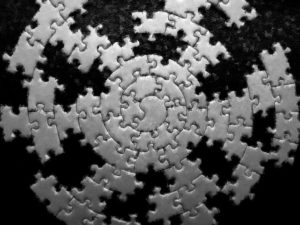In most traditional RPG campaigns, PCs face broadly three kinds of challenges: physical combat, social conflict, and intellectual puzzles.
The rules of the game usually cover physical combat in plenty of depth, and most groups can navigate difficult conversations without complex rule systems.
Puzzles, meanwhile, beguile us. We imagine an ingeniously interconnected set of traps or a complex mechanism that fires the players’ imaginations and challenges their minds. We imagine our players hashing out different solutions among themselves before finally arriving at the solution.
The reality rarely matches this dream. Players get frustrated after only a few minutes, mis-understand basic aspects of the puzzle, chase false leads for far too long, and often just route around it as much as possible.
Why? Two reasons:
1) People are different. Work with me on this obvious fact. People are very bad at understanding just how different other people are from them. Others may come at a puzzle from a very different perspective than you will, making it very hard for you to find a puzzle that works for others.
2) A person who can solve a particular puzzle trivially over lunch is not in the same mental state three hours into an RPG session. After a few hours of mental gymnastics, it can be very hard to both marshal the mental resources and direct them appropriately for puzzle solving. Not only are you tired; you’re in a different mental state, thinking more about your character and the ongoing plot and what your character will do in the next room than about how to spin a set of discs so that the letters all align.
As such, you can’t build a puzzle that will perfectly challenge all your players in whatever mental state they are when they encounter it.
Does this mean you shouldn’t use puzzles in your game? Certainly not!
The key is to keep them simple. It’s better to challenge your players with three simple puzzles than one longer, complex one. You can always up the ante after your players have shown themselves ready to handle it.

